Honoring India’s First Poets
From Vedic Sanskrit poems in the ancient Vedas crafted over 10,000 years ago to Hindi and English verses by Indian poets in modern times, poetry has found a special spot in the literary world. India has been the birthplace of some of the most versatile and talented poets and writers. Be it ancient poet Ved Vyas, Nobel prize winner Rabindranath Tagore, spiritual guru Kabir, or religious poetess Mirabai, each has been an iconic figure in the literary history of the country. By no means does the list end here, it is just a glimpse into the varied talent that exists. The country has also served as the birthplace of many more eminent poets whose works were a reflection of the social trend and guidelines for society. These include Kalidas, Tulasi Das, Sarojini Naidu, Nissim Ezekiel, Sri Aurobindo Ghosh, Narshin Mehta, Mahadevi Verma, Henry Vivian Derozio, Mirza Ghalib, Kamala Das, Amir Khusrow, Amrita Pritam, Mir Taqi Mir, Rahim, Gulzar Harivansh Rai Bachchan, Ramakrishna Paramhansa, and so many more. The versatility of these poets is such that they have penned not just in Hindi but also the nonliterary languages of different states in India as well as in English.
With some awe-inspiring biographies presented in this article, read on to know to learn more about the life and works of those considered to be the top ten Indian poets.
Rabindranath Tagore (May 7, 1861 – August 7, 1941)
Rabindranath Tagore wrote successfully in all literary genres, but was primarily a poet and lyricist for his own popular songs. In 1913, he became the first Indian to win the Nobel Prize because “of his profoundly sensitive, fresh and beautiful verse, by which, with consummate skill, he has made his poetic thought, expressed in his own English words, a part of the literature of the West.”
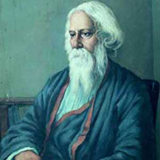
Here are some of his poems.
“Unending Love”
Rabindranath Tagore
I seem to have loved you in numberless forms, numberless times…
In life after life, in age after age, forever.
My spellbound heart has made and remade the necklace of songs,
That you take as a gift, wear round your neck in your many forms,
In life after life, in age after age, forever.
Whenever I hear old chronicles of love, it’s age old pain,
It’s ancient tale of being apart or together.
As I stare on and on into the past, in the end you emerge,
Clad in the light of a pole-star, piercing the darkness of time.
You become an image of what is remembered forever.
You and I have floated here on the stream that brings from the fount.
At the heart of time, love of one for another.
We have played along side millions of lovers,
Shared in the same shy sweetness of meeting,
the distressful tears of farewell,
Old love but in shapes that renew and renew forever.
Today it is heaped at your feet, it has found its end in you
The love of all man’s days both past and forever:
Universal joy, universal sorrow, universal life.
The memories of all loves merging with this one love of ours –
And the songs of every poet past and forever.”
This dancing of the light on the leaves
This playing of the wild winds
Among the sal groves
They have all maddened my mind
Along this red-earth road
That man going to the village market
The little girl sitting on the dust
Playing alone with her tray of toys
Whatever I see before me
They all make music in my eyes.Mine is only a bamboo flute
And I play only rustic tunes
An earthly bond of this dusty earth
Has bound my mind
I have borrowed my view
From the views of those boys
I have set my tunes
To the tunes of those boys
Who have drunk the lights
Flowing from the blue of the skies.
Whenever I want to go to a far away place
They crowd around me to dissuade
The village sky waving rustic flowers
Beckons me back
I am yet to exhaust whatever is near
And whatever is sweet
So I don’t hanker after
Whatever is far
All these titbits
I am yet to find
Their farthest limits
I am yet to finish my songs
Of these ordinary things.
So wherever I go
This only I sing
How much they have pleased
How they have held me in a spell
Day and night I have no time
To do anything else
My eyes are drowned
Drowned is my mind
Don’t call me
It’s of no use –
Let others aim something big
Let them gather more and more
Let me rove
Let me sing
I don’t want to be someone big.
============
‘Leave This’
Leave this chanting and singing and telling of beads!
Whom dost thou worship in this lonely dark corner of a temple with doors all shut?
Open thine eyes and see thy God is not before thee!
He is there where the tiller is tilling the hard ground
and where the pathmaker is breaking stones.
He is with them in sun and in shower,
and his garment is covered with dust.
Put off thy holy mantle and even like him come down on the dusty soil!
============
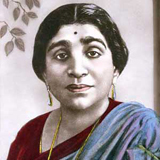
Gandhiji conferred Sarojini Naidu as the “Nightingale of India” began her writing career at the age of 13. The widely acclaimed book The Golden Threshold was her first collection of poems published in 1905. It combined traditional poetic forms with lush images of India. She earned worldwide praise from English writers such as Edmund Gosse and Arthur Symons.
Naidu was also a political leader who played an important role during the “Quit India” movement led by Gandhiji. She was the first woman President of the Indian National Congress and also the first woman governor of an Indian state. Her works are rich in imagery and explore wide variety of subjects including nature, love, death and patriotism.
============
Autumn
Like a joy on the heart of a sorrow,
The sunset hangs on a cloud;
A golden storm of glittering sheaves,
Of fair and frail and fluttering leaves,
The wild wind blows in a cloud.Hark to a voice that is calling
To my heart in the voice of the wind:
My heart is weary and sad and alone,
For its dreams like the fluttering leaves have gone,
And why should I stay behind?============
To India
O YOUNG through all thy immemorial years!
Rise, Mother, rise, regenerate from thy gloom,
And, like a bride high-mated with the spheres,
Beget new glories from thine ageless womb!The nations that in fettered darkness weep
Crave thee to lead them where great mornings break . . . .
Mother, O Mother, wherefore dost thou sleep?
Arise and answer for thy children’s sake! Thy Future calls thee with a manifold sound
To crescent honours, splendours, victories vast;
Waken, O slumbering Mother and be crowned,
Who once wert empress of the sovereign Past.================
Nissim Ezekiel (December 16, 1924 – January 9, 2004)
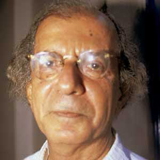
Nissim Ezekiel has been hailed as the father of post-colonial Indian English poetry. Innovative in technique, he subtly explored themes relating to everyday Indian life and helped move Indian-English literature beyond oriental and spiritual themes. Below is an extract from his poem The Patriot that is written in a distinctive Indian-English style. Written years back, it still applies for modern day lifestyle.
I am standing for peace and non-violence.
Why world is fighting fighting
Why all people of world
Are not following Mahatma Gandhi,
I am simply not understanding.
Ancient Indian Wisdom is 100% correct,
I should say even 200% correct,
But modern generation is neglecting –
Too much going for fashion and foreign thing.
Other day I’m reading newspaper
(Every day I’m reading Times of India
To improve my English Language)
How one goonda fellow
Threw stone at Indira behn.
Must be student unrest fellow, I am thinking.
Friends, Romans, Countrymen, I am saying (to myself)
Lend me the ears.
Everything is coming –
Regeneration, Remuneration, Contraception.
Be patiently, brothers and sisters.
You want one glass lassi?
Very good for digestion.
With little salt, lovely drink,
Better than wine;
Not that I am ever tasting the wine.
I’m the total teetotaller, completely total,
But I say
Wine is for the drunkards only.
What you think of prospects of world peace?
Pakistan behaving like this,
China behaving like that,
It is making me really sad, I am telling you.
Really, most harassing me.
All men are brothers, no?
In India also
Gujaratis, Maharashtrians, Hindiwallahs
All brothers –
Though some are having funny habits.
Still, you tolerate me,
I tolerate you,
One day Ram Rajya is surely coming.
You are going?
But you will visit again
Any time, any day,
I am not believing in ceremony
Always I am enjoying your company.
===================
Mirabai (1498–1547)
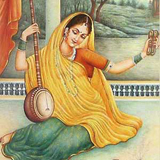
Mirabai was a 16th-century Hindu poet, a princess and devotee of Lord Krishna. She was in love with Lord Krishna from her early childhood and her poems are of love and devotion to her Lord. Her devotion to Lord Krishna made her go against the traditions and customs of her time and made her the most famous of the women poets of north India. Her love and devotion to Lord Krishna was the base of her writings. She has written poems exploring topics of divinity, mysticism, and love. Below is an excerpt of one her popular poems:
I am mad with love
And no one understands my plight.
Only the wounded
Understand the agonies of the wounded,
When the fire rages in the heart.
Only the jeweller knows the value of the jewel,
Not the one who lets it go.
In pain I wander from door to door,
But could not find a doctor.
Says Mira: Harken, my Master,
Mira’s pain will subside
When Shyam comes as the doctor.
===================
Tulsidas (1532–1623)
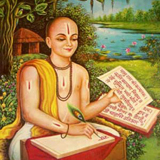
Tulsidas composed the epic poem Ramcharitamanas, which is thought to be one of the greatest works of Hindi literature. It re-tells the Sanskrit Ramayana in language that the common man can grasp.
Up till now I have lost much and wasted life in idle pursuits.
The grace of Lord Rama has aroused me from sleep.
Awakened now, I shall not allow myself to be victimized by Maya (illusion).
I have gained the grace of the Lord’s Name. I shall hold it fast to my bosom and not let it from me for a second.
The beautiful form of the Lord I shall cherish in my mind.
Long has this world mocked me, making me a slave of the senses.
Now I shall have no more of it.
I am now a bee at my Lord’s Lotus Feet and shall not allow my mind to leave the enjoyment of their nectar for a moment.
===================
Kabir Das (15th century)
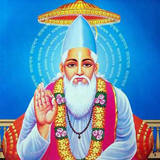
A poet admired by Hindus, Muslims and Sikhs all over the world, Kabir is a well-read poet in India. The poetry of Kabir is simple but comes with a profound life message and at the same is very easy to understand even for common people. Kabir is most renowned for his Doha also called couplets.
O SERVANT, where dost thou seek Me?
Lo! I am beside thee.
I am neither in temple nor in mosque: I am neither in Kaaba nor in Kailash:
Neither am I in rites and ceremonies, nor in Yoga and renunciation.
If thou art a true seeker, thou shalt at once see Me: thou shalt meet Me in a moment of time.
Kabîr says, “O Sadhu! God is the breath of all breath.”
===================
Kalidasa (4th – 5th century CE)
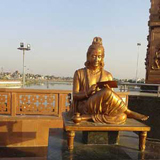
The ancient Sanskrit poet Kalidasa is widely regarded as the greatest Indian writer-poet of all time. Kalidasa means “the one who serves Goddess Kali.” His most celebrated work is the Sanskrit play Shakuntala, which is a dramatization of a Mahabharata episode relating to the daughter of Sage Vishwamitra. Shakuntala was the first Indian play to be translated into a Western language, and it has since been translated into at least 12 European languages. Kalidas has had a great impact on Indian literature and several subsequent poets, including Rabindranath Tagore.
===================
Sri Aurobindo Ghosh (August 15, 1872 – December 5, 1950 )
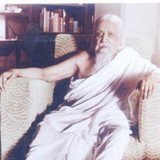
Most of us know Sri Aurobindo as an Indian philosopher, yogi, guru, and nationalist. But when you read some of his poems on themes of spirituality and mortality and translations of Vedas, Upanishads and the Bhagavad Gita, you will agree that his name should be included in this list of top 10 Indian poets.K. D. Verma shared this about Sri Aurobindo in his book The Indian Imagination: “It is no exaggeration to say that Aurobindo Ghose (Sri Aurobindo) is one of the greatest minds of the twentieth century. Aurobindo the mahayogi, Aurobindo the philosopher, Aurobindo the poet, Aurobindo the interpreter of Indian thought, Aurobindo the critic and Aurobindo the radical politician—all these hats fit him. I would argue that a proper and comprehensive revaluation of Aurobindo’s work and vision as a poet must take into account all aspects of his genius and achievement, for they are integrally related to the making of Aurobindo the poet.”
Here is an excerpt from one of his poem’s “Krishna.”
At last I find a meaning of soul’s birth
Into this universe terrible and sweet,
I who have felt the hungry heart of earth
Aspiring beyond heaven to Krishna’s feet
===================
Narsinh Mehta (15th-century)
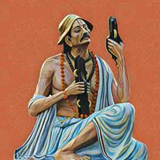
Narsinh Mehta a 15th-century poet-saint of Gujarat who inspired Gandhiji with one his famous bhajans, “Vaishnava Jana To.” He is known as Adi Kavi (Sanskrit for “first among poets”) in India and especially in Gujarat. Karen Pechilis, author of “The Poetry and Legacy of a Hindu Female Saint of India” describes Narsinh Mehta’s poetry,
“His poetry has circulated in diverse ways across centuries and regions, through melodic everyday songs, the social justice of Mahatma Gandhi, and the global reach of YouTube.”
===================
Mahadevi Verma (March 26, 1907 – September 11, 1987)
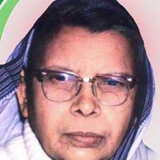
Mahadevi Verma was born in a Hindu family, and it was her mother who inspired her to write poems at an early age. As a poet, Verma is known as the “modern Mira” due to her emotional sentiments and love of nature. She has been called the grand dame of Hindi literature. Verma held the position of Vice-Chancellor of Prayag Mahila Vidyapeeth and was awarded the Padma Vibhushan.
As mentioned at the beginning of this article, choosing the top 10 Indian poets is not an easy task. We have attempted in this article to list them. We have included many more on our website: www.deshvidesh.com/TOP10POETS. Also included are a few of their popular poems on our website.






























